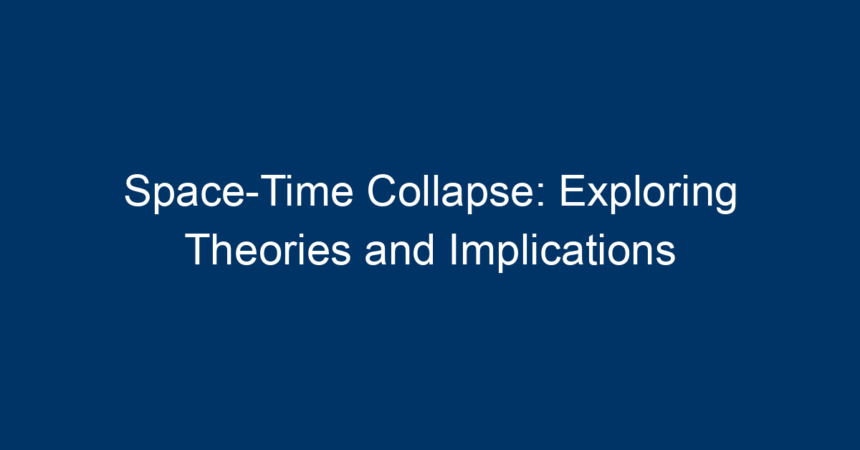The universe, with its enigmatic dimensions and profound mysteries, has always fascinated human curiosity. Among the most intriguing concepts in modern physics is that of space-time collapse. This phenomenon not only challenges our understanding of the cosmos but also beckons us to explore its implications on the nature of reality, time, and the universe itself. In this article, we delve into the theories surrounding space-time collapse, exploring its origins, implications, and potential future research.
What is Space-Time Collapse?
Before we dive deep into the theories and implications, it’s essential to understand what space-time collapse means. In simple terms, space-time refers to the four-dimensional continuum that merges the three dimensions of space with the dimension of time. This fabric of the universe bends and warps due to the presence of mass and energy. A space-time collapse occurs when this continuum is disrupted to the extent that it undergoes a catastrophic failure, leading to unpredictable outcomes in both time and space.
The Roots of the Concept
The idea of space-time collapse isn’t just a theoretical construct; it emerges from significant scientific advancements over the past century. Key theories contributing to this concept include:
-
General Relativity: Albert Einstein’s groundbreaking theory describes how massive objects distort space and time. This bending creates gravity, but it also hints at possibilities for space-time anomalies.
-
Black Holes: Black holes serve as prime candidates for examining space-time collapse. Their gravitational pull is so immense that once crossed by any object (the event horizon), it cannot escape. This leads to a theoretical point of infinite density known as a singularity where traditional laws of physics break down.
- Quantum Mechanics: Quantum theories introduce elements of uncertainty and probability, suggesting that space-time is not as straightforward as once thought. The interaction between quantum particles, coupled with gravity, can lead to scenarios where space-time may collapse or behave unpredictably.
Theories Surrounding Space-Time Collapse
The exploration of space-time collapse breeds a multitude of hypotheses, each offering unique insights into the nature of reality.
1. Time Travel and Causality
One of the most captivating theories arising from the notion of space-time collapse is its potential link to time travel. If space-time can be manipulated or collapsed, could we theoretically travel backward or forward in time? While time travel has largely remained in the realm of science fiction, some physicists propose models, such as wormholes, that could allow for such experiences. However, these models also bring forth complex discussions regarding causality and the “grandfather paradox”—a scenario where changes in the past could negate one’s existence.
2. Multiverse Theory
Space-time collapse is also intertwined with the multiverse theory, suggesting that our universe is just one of many. In this model, a collapse could theoretically lead to the formation of new universes, each with its own distinct timeline and set of physical laws. This paradigm shift fundamentally questions our singular understanding of reality, opening avenues for endless possibilities.
3. Entropic Forces and Space-Time
Entropic forces—the tendency of systems to move towards disorder—offer another lens to view space-time collapse. Some theories propose that as entropy increases, certain regions of space-time may collapse, leading to the emergence of new physical laws. This could challenge established notions of time’s arrow, as the collapse could influence the flow and direction of time itself.
4. Quantum Gravitational Effects
As we delve deeper into quantum mechanics, the quest to unify it with general relativity has become paramount. Theories such as loop quantum gravity and string theory consider the fabric of space-time as being made up of discrete units rather than smooth continuum. In scenarios where these quantum gravitational effects play a significant role, localized space-time collapse may emerge, which could ultimately reshape our understanding of reality.
Implications of Space-Time Collapse
The ramifications of space-time collapse extend beyond the theoretical; they provoke profound philosophical questions and technological implications.
1. Philosophical Reflections
If space-time collapse becomes an accepted reality, it could fundamentally alter our perception of existence, free will, and destiny. How do our actions influence timelines? Are past decisions immutable, or can we navigate through wormholes to alter history? Such inquiries not only challenge scientific frameworks but also provoke intense philosophical debate.
2. Technological Frontiers
The implications of mastering space-time collapse could lead to revolutionary advancements in technology. Imagine harnessing the energy from a collapsed space-time region or using wormholes for instantaneous communication across vast cosmic distances. These advancements could transform transportation, energy systems, and communication, making what once was science fiction a possibility.
3. Astrophysical Observations
Understanding space-time collapse could also advance our astrophysical observations. Tools like gravitational wave detectors and advanced telescopes could help us observe events surrounding black holes and neutron stars, leading to further discoveries about space-time and its properties.
Challenges and Future Research
While the exploration of space-time collapse offers exhilarating possibilities, it is fraught with challenges. Theoretical models are still in their infancy, often relying on complex mathematics that may not yet have physical analogs in our observable universe.
Future Directions
-
Interdisciplinary Approaches: Bridging fields such as quantum physics, cosmology, and philosophy will be crucial for developing broader frameworks to understand space-time collapse.
-
Experimental Evidence: Developing experimental designs to test theories regarding space-time collapse rigorously remains a priority for researchers.
- Public Engagement: As we delve into concepts that stretch our understanding of reality, fostering public discourse on the implications of space-time collapse will be essential. This can inspire greater interest in science and encourage new generations of physicists and researchers.
Conclusion: Embracing the Mystery of Space-Time Collapse
The concept of space-time collapse beckons us to embrace the mysteries of the universe. While we stand at the precipice of understanding, the potential for discovery remains boundless. As we navigate through existing theories, reflect on implications, and face challenges ahead, one thing is clear: the journey into the depths of space-time collapse could forever change our perception of reality.
As we continue to explore these profound questions, the universe invites us to challenge, innovate, and discover the secrets of existence. Whether in the realm of theoretical physics or practical applications, the exploration of space-time collapse is not just an academic endeavor; it’s a journey into the very essence of what it means to be a part of the cosmos.
Embrace the adventure, for the universe has much more to reveal.




